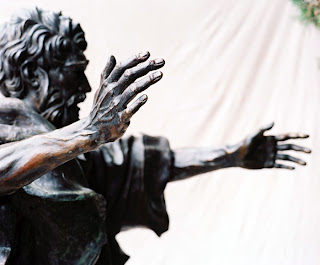The Ministry Of The Gospel In Our Ever-changing Culture
This coming Saturday I will be teaching in Malta, Montana on a presentation titled, “The Ministry of the Gospel in our Ever-Changing Culture.”
In this presentation I will be discussing the historic
shifts of the church from the Pre-Constantinian Era (e.g. 32-313 A.D.) to a what was called the Constantinian Era (e.g. 313-1962 A.D.) and
then to what is now called the Post-Constantinian Era (e.g. 1962 A.D.-Present). CLICK HERE to view the powerpoint slide show.
With the shift of
the church from a position of influence and cultural support (i.e. The Constantinian Era) to a position of little cultural respect and little cultural support (i.e. The Post-Constantinian Era), we have also seen a parallel shift in societal thought from modernism to postmodern. Consider the following video as an example of postmodern thought as well as an example of how Generation X'ers think compared to a Baby Boomers.
While there are both positive and negative things that have occurred with the deconstruction of the Constantinian Era, we cannot embrace the presuppositional
ideology of postmodernism. However, please keep in mind that in rejecting postmodernism we do not reject it in favor of modernism. The reason being, modernism is rooted in the Enlightenment and has the same ideological DNA as
postmodernism. Modernism is the mother of postmodernism. Rather, the church
appeals to a scriptural foundation for the source of its epistemological framework. Albert Mohler in the book, “Whatever Happened To Truth?” says, “A scriptural foundationalism is not
grounded in the finite human subject as both modernism and postmodernism
attempts to do, but instead is rooted and grounded in the Bible’s own
presentation of the triune God.”
The good news in thinking about all of this is that the church stands on the Word of God, Christ Crucified. The church and the message of the Gospel survived the Pre-Constantinian Era and certainly will do so in the Post-Constantinian Era. Furthermore, the choice before us is not between postmodernism and modernism. Rather the calling is back to the scriptures as our foundation. My friends the truth of Jesus' Word, "...has power of its own, a power that in the long run proves stronger than the usurped authority of institutional power. Jesus embodies this hope, the hope of the ultimate triumph of truth in the reign of his kingdom."[1] Here in the Word we find comfort, assurance and hope in the midst of our Post-Constantinian Era and in the midst of postmodernism.
The Ministry Of The Gospel In Our Ever-changing Culture Slide Show:
-----------------------------
[1] Andreas Kostenberger, Whatever Happened To Truth (Crossway, 2005), 51.

Comments